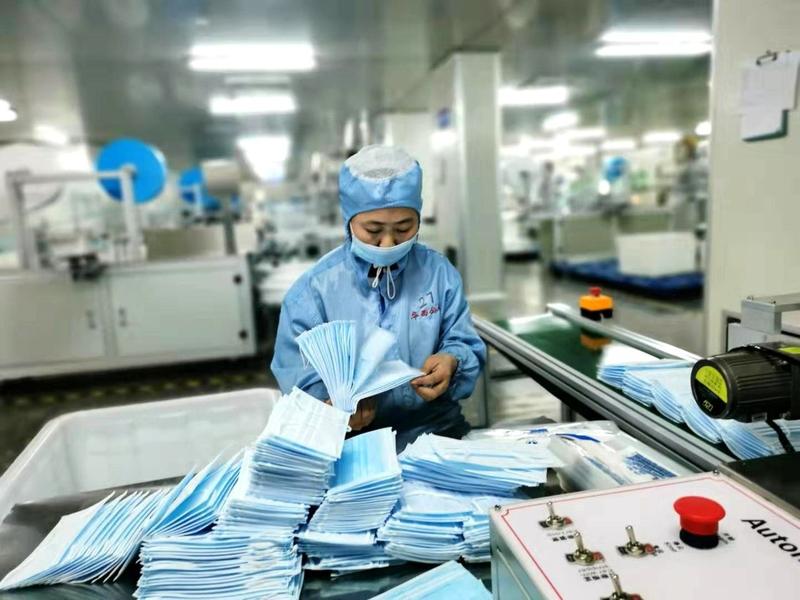 In Changyuan, near Xinxiang in China's Henan province, face mask factories are working around the clock to increase output. (PHOTO PROVIDED TO CHINADAILY.COM.CN)
In Changyuan, near Xinxiang in China's Henan province, face mask factories are working around the clock to increase output. (PHOTO PROVIDED TO CHINADAILY.COM.CN)
China's State-owned energy giants are ramping up raw material supplies that are key to produce protective products against the novel coronavirus, to help ease the shortage of medical supplies.
However, when logistics improves and workers return to work, the supply shortage will ease due to the full operation of manufacturing units.
Li Li, a senior analyst with JLC
China Petrochemical Corp, also known as Sinopec Group, had produced 15,000 metric tons of raw materials including polypropylene, for masks, syringes and other medical supplies over the first week of February, with an additional 80,000 tons to follow this month, the company said.
It also plans to produce 160,000 tons of medical grade synthetic resin over the first two months of this year, with a year-on-year increase of 45,000 tons.
Its unit, Sinopec Jianghan Salt Chemical Hubei Co Ltd, a domestic leader in disinfection products located in Qianjiang city, Hubei province, is producing raw materials for liquid sterilant with full-load capacity.
ALSO READ: Makers of surgical masks boost production to meet rising demand
As China's largest oil refiner, Sinopec Group has also partnered with mask manufacturers to expand their mask production capacity by providing them equipment and raw materials.
A total of 11 new production lines will be set up by the end of February, with daily mask production capacity to reach 600,000 pieces and more than 1 million pieces by Feb 29 and March 10, respectively, according to the company.
China National Petroleum Corp, or CNPC, has also been expanding production of raw materials necessary for protective supplies for medical workers on the frontline fighting the novel coronavirus pneumonia, including disinfectants, protective suits and masks.
Dalian Petrochemical Co, a subsidiary of CNPC, has delivered more than 600 tons of polypropylene to Guangdong to ensure production of medical gear, while its subsidiary Hohhot Petrochemical Co in North China's Inner Mongolia autonomous region, a major producer of polypropylene in the country, has also been ramping up polypropylene production under strict standards.
Hohhot Petrochemical plans to produce 3,000 tons of polypropylene. Each ton of the raw material is expected to produce about 250,000 protective masks.
According to CNPC, six subsidiaries of the company are currently under stable operation with high load to ensure sufficient medical material production.
Its chemical marketing subsidiaries are also strengthening production, sales and transportation to ensure that the materials are sent to the frontline as soon as possible.
Li Li, a senior analyst with JLC, a leading market intelligence and consultancy service provider for energy and commodities in China, said the ongoing shortage of protective masks and suits will ease off if the epidemic is controlled while factories resume production.
Data from JLC showed polypropylene production, a main raw material to produce protective masks and suits, reached 25.49 million tons in capacity in China in 2019, while the total production was 20.96 million tons, far greater than the need to cover the demand for mask production.
The current shortage is a combined result of the sudden demand surge from ordinary people due to the outbreak of the virus when Chinese manufacturers were away for a holiday break, and the key to solve the problem is the resumption of logistics and production, she said.
"Masks are mainly used by those who work at factories and hospitals, and few families would have a stockpile of masks for daily use, even though people would wear them at times of air pollution or flu," she said, adding it is the same with shortage of protective suits.
READ MORE: Epidemic impact on China to be limited
"Owing to the sudden outbreak of the epidemic, it is difficult for manufacturers to ramp up production in a short time. However, when logistics improves and workers return to work, the supply shortage will ease due to the full operation of manufacturing units."
Zhong Nan contributed to the story.
Contact the writers at liuzhihua@chinadaily.com.cn


